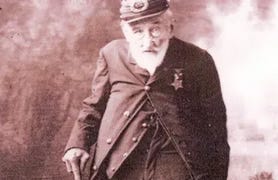Opportunity cost.
It is September 18, 1862.
A day of great American sadness.
Thousands of dead and wounded Americans lay on farm fields in southern Maryland.

The day before, McClellan’s Army of the Potomac and Lee’s Army of Northern Virginia, had met in battle along southern Maryland’s Antietam Creek.
Total casualties exceeded 23,000.


The battle had begun with Confederate General Robert E. Lee, who had taken the war north, into Union territory.
He had hoped to secure victories in Maryland and Pennsylvania which would bring European nations to the Confederates’ side.
But McClellan’s army was determined to drive Lee’s forces out of Union territory.


Some say the one-day battle at Antietam was a draw, but McClellan’s forces succeeded in turning back Lee’s invasion force.
The next day, September 18, Lee ordered his army to withdraw from the battlefield and retreat south, across the Potomac River, back into Virginia.


News of the battle rippled across the country.
A dispatch from Harrisburg, Pennsylvania, to the New York Times, dated September 17:
“A reliable person, just in, reports the battle as still progressing – the bloodiest encounter of the war, perhaps of any on record.”

A later dispatch from Washington, received at the Times office near midnight:
“ [The Rebels have] been driven steadily back [south] toward the Potomac, and it was believed that the fighting was mainly by their rear guard,
“which was contesting the advance of our troops, and covering the retreat of the rebel main body.”

There weren’t enough doctors, facilities or medical supplies to handle the battle’s casualties.
On September 18, 1862, more than one thousand wounded men lay in the house, barn and in tents on the farm of Otho Smith.

Wounds were wrapped in corn husks.
Amputated limbs were thrown in piles.
The dead were buried quickly on a ridge located away from the well which supplied the farm with water.


Walt Whitman, who served as a nurse in Washington hospitals during the war, left notes from conversations with a patient wounded at Antietam:
“there was a very large barn & farm house—
“the barn was filled with wounded, & the barn yard, an[d] the farm house as full as it could stick—
“a peaceful barn, [inserted “now bloody”] the fragrant hay they used to place the men on for operations—
“they turned the cattle out of their stalls.”

On September 18, as burial details went to work on the Antietam battlefield, surgeon Anson Hurd and nurse Maria Hall tended to the wounded.
From Maria Hall’s memoirs:
"Many last messages were taken and many precious treasures were committed to our charge
“to be sent along with a lock of hair and the last words to the sorrowing ones at home.”


Hurd would resign his military commission in December, citing exhaustion.
He couldn’t do this anymore.

Two weeks after the battle, Lincoln made a rare visit to the front to speak with McClellan at his Antietam headquarters.
‘You must pursue Lee,’ Lincoln had said, accusing McClellan of being overly cautious.
Lincoln followed up the meeting with a letter to McClellan ten days later:
“Are you not over-cautious when you assume that you can not do what the enemy is constantly doing?
“We should not so operate as to merely drive him away.
“If we can not beat the enemy where he now is, we never can…”
But there was no pursuit.
So, Lincoln relieved McClellan of his command on November 5, one day after the midterm elections.
Had McClellan pursued Lee, as Lincoln requested, the Civil War might have ended in the East, sparing hundreds of thousands.
It was a monumental missed opportunity.
Instead of hope, a pall descended across the land on September 18, 1862, which would last for years.
********************
I’ll see you tomorrow.
— Brenda
Banner image: Civil War veterans at the 50th Gettysburg renunion, July 1913.















Share this post